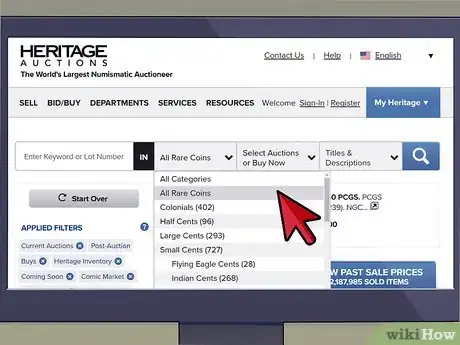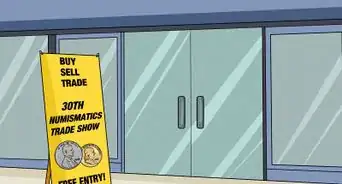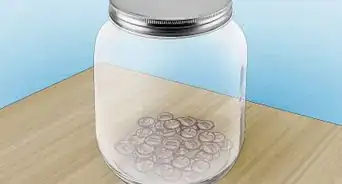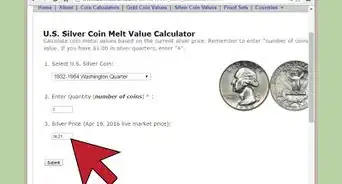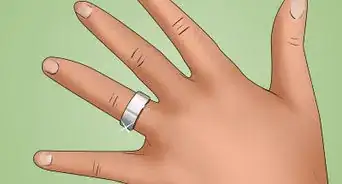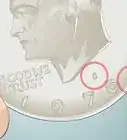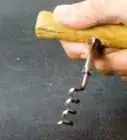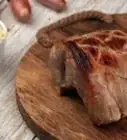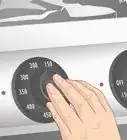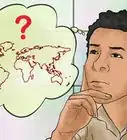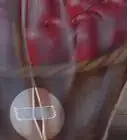This article was co-authored by wikiHow Staff. Our trained team of editors and researchers validate articles for accuracy and comprehensiveness. wikiHow's Content Management Team carefully monitors the work from our editorial staff to ensure that each article is backed by trusted research and meets our high quality standards.
There are 7 references cited in this article, which can be found at the bottom of the page.
wikiHow marks an article as reader-approved once it receives enough positive feedback. This article received 27 testimonials and 84% of readers who voted found it helpful, earning it our reader-approved status.
This article has been viewed 505,258 times.
Learn more...
If you’ve got some old coins you want to sell but you’re not sure where to start, don’t worry. We’ve put together a comprehensive guide to help you sell your coins and get the most money for them. We’ll walk you through how to value your coins, find buyers, and start making sales. Check out the steps below to get started!
Things You Should Know
- Identify your coins and then research their value or ask an appraiser to take a look. Don’t clean old or dirty coins—collectors like them natural.
- Locate buyers through reputable coin dealers, coin shows, collector magazines, or online auctions.
- Sell entire collections to buyers who offer you a fair deal. Make sure to document your sale for tax purposes.
Steps
Valuing Coins
-
1Identify the coin. Before you can sell a coin, you need to know what coin you have. First, find the coin’s denomination, then note the date and mint mark. These pieces of information will be somewhere on the coin. You can then type them into an online search engine to figure out what coin you have.
- Coin dealers and collectors may be able to help you, too. Take a clear photo of both sides of the coin and send it to coin collector groups online when you can’t bring the coin in person.
-
2Note the coin’s condition. The condition of the coin affects value. Look over both sides of the coin again. Does it look dirty or scratched? The worse the damage is, the less value you’ll get for your coin. Also look for any printing errors, since these often increase the value.[1]
- Coins are graded on a 70-point scale where 0 is “Poor” and 70 is “Mint Condition.” Coins rated “Good” or 6 are actually very worn, and ones rated “Fine” or 12-15 have a medium amount of wear.[2]
- Don’t attempt to clean the coin! Coins are historical artifacts and collectors like them natural. Cleaning can actually damage the coin further.
Advertisement -
3Look up the coin’s value. Once you know what coin you have, you can estimate how much it’s worth. There are plenty of sites online that maintain a list of current coin values. Another option is to go to your local bookstore and order the The Official Red Book, which is an official and very detailed guide of coin values.[3]
- Coins are listed at wholesale price. You may not get as much when you sell the individual coins.
-
4Monitor auctions to find out how much your coin is worth. More information on coin values can be found by searching recent sales. All sorts of coins pass through sites such as Heritage Auctions. Search for coins similar to the one you own to get a glimpse of how much others are paying for them.[4]
-
5Get an appraiser to value coin collections. Appraisers are necessary when you’re selling valuable coins or a large collection. Search your local phone directory or online to find a trustworthy coin appraiser or dealer. They’ll analyze each coin, verify its authenticity, and tell you how much it’s worth.[5]
- Look at online reviews from other customers or consult the Better Business Bureau to vet the appraiser’s reputation.
- Many respectable dealers are members of groups like the American Numismatics Association or Professional Coin Grading Service. Use these sites to find trustworthy appraisers.
-
6Group coins by value. Different buyers specialize in different types of coins. If you’re selling multiple coins at a time, try to separate them into value-based groups. Make groups of high, medium, and low-value coins. How you group the coins is up to you, but the easiest way to do this is by wholesale value.[6]
- You can also separate the coins based on how worn they are, the metal used in them, or where they were printed.
Finding Buyers
-
1Speak to reputable coin dealers. Local coin dealers are natural places to visit first when selling coins. Mostly you’ll sell low and medium-value coins here. When you go to a dealer, look at their stock. If they have a lot of coins made of the same metal and of similar quality to the ones you’re selling, chances are they’ll give you a fairer price.
- Many dealers can also handle rare coins, but you’ll usually get more money from auctions or private collectors when selling these coins.
- Remember that dealers are running a business. To make a profit, they’ll pay you less than the wholesale price.
- It’s best to let multiple dealers evaluate your coins. Stay polite as you continue to shop around.
-
2Visit coin shows. Coin shows bring together large numbers of buyers and sellers. Look for people dealing in coins of similar quality to the ones you’re selling. Discuss a fair selling point, but don’t feel pressured to sell. You won’t always get a great offer at a coin show, but you’ll have an opportunity to find trustworthy dealers and meet people who can guide you in the right direction.[7]
-
3Search for online coin dealers. These sites are a fast way to sell coins from your own home. You can find sites willing to buy both common and rare coins. Again, keep an eye out for dealers focusing on the kind of coins you’re selling. A dealer of rare gold coins isn’t likely to be interested in a wheat penny or buffalo nickel.
- Take good pictures of the coins to get more interest and fairer offers for your coins. Work in a well-lit environment so the lettering and mint marks are as visible as possible.
-
4Pick up coin collector magazines. Publications such as Numismatic News and Coin World feature advertisements from coin dealers. While the magazines offer enlightening information on coin sales, they may also reveal your perfect buyer. Pick up one in your local coin shop or by looking online.[8]
- Whatever you do, avoid advertising in your local newspaper. Even if you meet someone in a safe place, this makes your coins a potential target for thieves.
-
5Submit the coins to auctions. Coin auctions happen both online and in person. They come in all sizes and can be local, regional, or national. Try to find an auction that features a lot of coins of similar material to yours, such as copper or silver. Auctions are unpredictable, so you may earn less than what a dealer would pay or you may get an unexpected boost to your sale price.
Handling Sales
-
1Choose buyers who give you a fair analysis. Unscrupulous buyers give low offers in the hopes of getting a better deal. Watch the person evaluate your coins, if possible. They should analyze each coin individually. Avoid anyone who offers you a flat price without bothering to take a long look at the coins. Say no to any buyer who pressures you into selling coins immediately.
- Look for dealers with positive reviews and accreditation from well-known numismatics organizations.
-
2Have the coins evaluated by many buyers. Shop around to get the most from your coins. Let multiple dealers evaluate their coins and make offers on them. Tell each one that you’ll “think about their offer and come back later.” Then, when you’re ready to sell, choose the dealer that you feel comfortable doing business with.[10]
-
3Sell collections as a whole. When selling a plentiful collection of coins, it’s better to keep the coins as a package deal. Many dealers will be interested in only a few coins. They’ll pick out the high-value coins, leaving you with a less valuable collection that’s harder to sell. Set a price for the total collection and stick to it.
-
4Keep documentation of your sales. Even a coin you got for free can cause you legal problems. Your government likely taxes any profit you make off of sold coins. That’s why it’s important to keep a detailed list of every sale you make as well as any coin purchases.[11]
- Consult your local tax laws to find out how to report your income.
Community Q&A
-
QuestionHow do I find someone who specializes in old coins?
 Community AnswerTry researching your local coin and stamp businesses. If that fails, do an online search of your surrounding area. And if that doesn't work, make a post on social media and share it with your friends. Ask them to share it with their friends. Social media is an extremely powerful resource!
Community AnswerTry researching your local coin and stamp businesses. If that fails, do an online search of your surrounding area. And if that doesn't work, make a post on social media and share it with your friends. Ask them to share it with their friends. Social media is an extremely powerful resource! -
QuestionI have two 1988 one-cent coins. Are they worth anything?
 DonaganTop AnswererBy collectors' standards they're not very old, so they're probably not worth more than their face value.
DonaganTop AnswererBy collectors' standards they're not very old, so they're probably not worth more than their face value. -
QuestionHow can I sell my old wheat penny collection for fair price?
 Community AnswerAny wheat penny is worth at least 4 cents to most dealers. Given the popularity of collecting Lincoln wheat cents, there will always be a demand for quality coins.
Community AnswerAny wheat penny is worth at least 4 cents to most dealers. Given the popularity of collecting Lincoln wheat cents, there will always be a demand for quality coins.
Warnings
- Attempting to clean a coin can damage it and lower its value. Buyers prefer coins in their original state.⧼thumbs_response⧽
References
- ↑ http://www.coinstudy.com/selling-coins.html
- ↑ https://coins.ha.com/tutorial/coin-grading.s
- ↑ http://cointrackers.com/sell-your-coins/
- ↑ https://coinweek.com/coins/coin-collecting-strategies-2/ten-tips-for-selling-your-coins/
- ↑ https://coins.thefuntimesguide.com/appraising_coins/
- ↑ http://www.coinstudy.com/selling-coins.html
- ↑ http://www.coinstudy.com/selling-coins.html
- ↑ http://www.coinstudy.com/selling-coins.html
- ↑ http://coinsguide.reidgold.com/fraud.html
About This Article
To sell old coins, take low and medium-value coins to a reputable coin dealer, where you should be able to easily sell them. If you can't find a local coin dealer, try visiting a traveling coin show so you can network with dealers and find someone to buy your coins. If you have rare coins, save them for auctions and private collectors, who will usually pay more money for high-value coins. You can find auctions and private collectors online through websites like eBay. To learn how to value old coins, keep reading!



